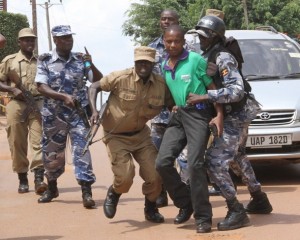
Associated Press/Rebecca Vassie – Ugandan police arrest a journalist outside the Daily Monitor offices Wednesday, May 29, 2013.
Ugandan police on Thursday ended their occupation of a newspaper after 10 days during which they looked for evidence against an army general accused of publicly discussing politics.
The Daily Monitor reported on its website that some staff accessed its premises in the capital, Kampala.
Hillary Onek, Uganda’s interior minister, told reporters that the newspaper was allowed to operate again after its managers agreed not to publish stories that could spark insecurity or hatred.
“They acknowledged that there had been violations of their editorial policy by their reporters and editors in Uganda,” Onek said, referring to the Daily Monitor’s bosses.
National security is a “no-go area” for reporters, he said.
The Daily Monitor faced pressure to reveal how it obtained a letter in which Gen. David Sejusa urged the internal security service to investigate reports that high-ranking officials opposed to the political rise of the president’s son risk assassination. Sejusa, who is in London and faces arrest upon his return to Uganda, cited himself among those who might be targeted. The newspaper has resisted efforts to have its reporters give a copy of Sejusa’s letter to the police, saying it goes against press freedom.
Sejusa had traveled to London when details of his letter became public and he has since cancelled a scheduled trip back to Uganda. Police deployed heavily at Uganda’s international airport on May 11, the day Sejusa was originally scheduled to return from London.
Joseph Luzige, Sejusa’s attorney in Kampala, said his client has requested —and been granted —the protection of British police after reporting a threat to his life. British officials said they had no comment on Sejusa’s case.
Sejusa’s letter has sparked controversy in this East African country that has had one president since 1986. Some analysts say the political turmoil it generated points to a power struggle among the military elite as President Yoweri Museveni’s power fades.
There is uncertainty about who might succeed Museveni if he decides to retire at the end of his current term in 2016, and there is talk that his son —a senior army officer named Muhoozi Kainerugaba —is being groomed to succeed his father. Last year Kainerugaba was promoted to the rank of brigadier and he took full charge of Uganda’s special forces, an elite group within the military that protects the president and guards national assets such as oil fields.
Sejusa, 58, a four-star general who is a decorated hero of the bush war that brought Museveni to power, has a long history of standing up to the president. Many here believe he is likely to return home from London and launch a presidential bid if he is dismissed from the army.
More than two weeks after Sejusa’s letter was leaked, Museveni announced changes in the military that saw the ouster of army chief Gen. Aronda Nyakairima and his deputy. Nyakairima, who had been cited in Sejusa’s letter among those opposed to the rise of the first son, was given a civilian post as interior minister. His deputy, Lt. Gen. Ivan Koreta, was made an ambassador.
Sejusa told The Associated Press in a statement Wednesday that he was fighting the use of state institutions to keep Museveni in power. Uganda’s military laws bar serving officers and soldiers from engaging in electoral politics, the reason Sejusa says many in the army are disgruntled over the president’s alleged reluctance to approve their retirement applications.
“I refuse to succumb to perpetual abuse,” he said. “(The president) must set us free and set my suffering comrades free or we shall free ourselves. I speak for those gallant officers who are virtual prisoners in the army but can’t say a word because they fear to be framed … or worse. ”
Sejusa warned that “abusing the law and institutions just to keep the current leadership in power … pretty soon will lead to ceaseless strife” in Uganda, which hasn’t had a single peaceful transfer of power since independence from Britain in 1962.
– AP






